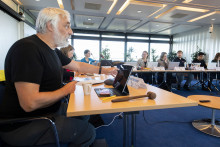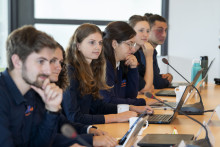At the UT, participation is organised at the central level (the University Council) and at the decentralised level (service councils and faculty councils). All these different councils have their own election committee and electoral regulations. 'While in broad strokes the regulations and are the same,' as explained by Valentine Veenhof, who was involved from the Human Resources department. 'Since there were more similarities than differences, we were looking at ways to group it together.'
Therefore, there will now be one central set of regulations, one central election committee and one annual election week. Veenhof states: 'This way, candidates have one point of contact and there is uniformity in the regulations. And by bringing all elections under one central committee, we also hope to relief pressure on the organisational side.'
Reinforcing
But the main reason is to strengthen participation, say Veenhof and chair of the University Council Herbert Wormeester. 'That is the big advantage of one election week. It allows us to generate much more attention to participation and its importance,' said Veenhof. 'Through good participation you get good governance. And good governance deserves good participation,' said Wormeester.
That is why it is important that there is something to choose from, says Wormeester. 'In the past, some elections were cancelled because number of candidates was too few. Having one election week can increase enthusiasm; it is clear to candidates when they can run for the election, campaigning can be done together and the community knows when voting can occur.'
Potential pitfalls
Veenhof and Wormeester also point out the potential pitfalls of centralising the university’s democracy. 'The local context matters,' says Wormeester. 'Which is why we need to keep room for diversity, even in the central regulations. For example, for the ITC faculty, there is room for an exception; because for that faculty, due to its student population, it is better to hold these elections at the end of the calendar year instead of the end of the academic year - as is the case for the UT-wide election week.'
Veenhof points out the potential danger of the decentralised elections getting overshadowed in the new set-up. 'Of course we hope that won’t happen. The University Council is the central participation body, so of course that will get a bit more attention. We hope that UT members know how to reach the participation at all levels.'
Towards the next summer holidays, the first UT-wide election week will take place.







